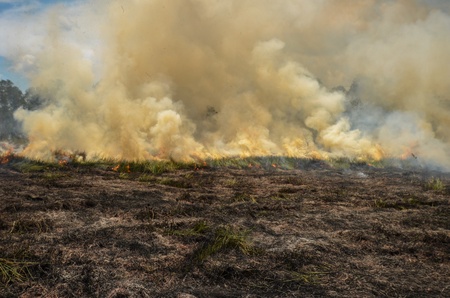Scientists from the University of Aberdeen will travel to the Falkland Islands as part of a £230,000 research project that aims to help better understand the impact of peatland fires on global CO2 levels.
The project will use innovative techniques to study how the frequency, extent and intensity of burning in peatland fires affects the ability of peatland environments to store carbon.
While covering just 3 per cent of the Earth’s surface, peatlands are globally important ecosystems and store twice as much carbon as the world’s forests, mitigating the effects of climate change by taking greenhouse gases out of the atmosphere.
However, peatlands are becoming more fire prone, thus reversing this effect by rapidly returning carbon to the atmosphere as CO₂. Understanding the extent to which this happens is crucial in measuring the resulting impact on global CO₂ levels.
As an environment where peatland fires frequently occur, the Falkland Islands provide a unique laboratory to measure their impact. They may also provide important clues as to how peatlands in Scotland may store carbon in the future, as climate change increases the risk of peatland fires in the Northern Hemisphere.
Dr Dmitri Mauquoy and Dr David Muirhead from the University’s School of Geosciences will travel to the Falklands early next year as part of the project, which is funded by the Leverhulme Trust.
“This project will merge geoscience and bioscience in innovative ways, using techniques typically used in geological settings, for example the oil and gas industry, and applying those to an environmental focus,” Dr Muirhead explained.
“One of the techniques we will use is Raman spectroscopy – a versatile and non-destructive technique which we routinely use in Aberdeen to understand thermal maturity of carbon, for example in hydrocarbon basins – to investigate the relationship between the frequency, extent and intensity of burning, and the amount of carbon stored in peatlands over decades, centuries and millennia.”
Using this technique to measure the intensity of previous burning episodes is a crucial aspect to the project, potentially producing more accurate results than similar, previous studies.
Dr Mauquoy explained: “Previous approaches will tell you when and where peatland fires occurred, but they won’t tell you how hot the fires were – this is important, as we need to understand the damage caused to peatland ecosystems by intense fires.”
He added: “Because of climate change and human disturbance a lot of peatlands are burning more frequently, so we need to understand what this means in terms of the ability of peatlands to draw down carbon from the atmosphere.
“That is why we’re going to the Falkland Islands – half of the islands are peat covered but they’re also very dry, so we’re interested to see how peatlands function in the extremes of where they can form.
“In Scotland we expect to experience drier summers leading to more peat fires, and these Southern Hemisphere peatlands could provide valuable clues as to how Scottish and other important Northern Hemisphere peatlands – such as those in Russia and North America – may store carbon in the future.”


